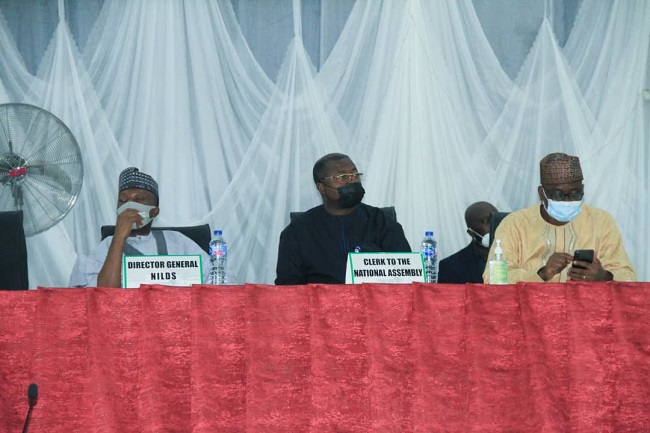The Director-General, National Institute for Legislative and Democratic Studies (NILDS), Prof Olanrewaju Suleiman, on Wednesday, tasked legislative aides on the need to contribute positively to the legislative and policy-making process in the country.
Prof Suleiman who gave the charge in Abuja during the opening ceremony of the three-day capacity building workshop for Legislative Aides reiterated the Institute’s resolve towards the implementation of the annual work-plan on capacity building of all stakeholders in the Democratic Institution.
Prof Sulaiman who applauded the leadership of the National Assembly for demonstrating an unparalleled commitment to strengthening the capacity of legislative aides who provide vital support services to legislators stressed the need for the Legislative Aides to work hard to shed off negative stereotypes attached to legislative aides such as ‘political thugs’, ‘troublemakers’, ‘errand boys’ or ‘bag carriers’.
“Only recently, Mr President requested assistance from the British High Commission and other international partners in enhancing the capacity of both lawmakers and their aides. On his part, the Rt. Hon Speaker has equally canvassed for capacity development targeted at all levels of aides and staff in the National Assembly especially those that provide highly specialised services.
In the last quarter of 2020, the Institute’s Governing Council led by the two Presiding Officers issued a directive that the training of aides should be prioritised. It is in line with this vision of Leadership and Council, that the Institute dedicated a substantial part of its annual work-plan to building the capacity of aides through systematic capacity building and the provision of technical advice and comparative research.
“The Institute plans to reach out to all 3000+ Legislative Aides in a three-year cycle (1,000 annually). This is, no doubt, the most ambitious and all-encompassing capacity development of aides since 1999 and I must give the credit to the Leadership of the 9th Assembly.”
ALSO READ: Court sentences man to 3 years jail term for raping 19-yr-old girl
He explained that the capacity development activities targeting Legislative Aides were developed based on a capacity needs assessment survey conducted by the Institute earlier this year.
“Accordingly, the Institute has grouped legislative aides into beginners, which include those who are new on the job, intermediate, comprising of those that have more than 4 years of experience as legislative aides, and advanced, consisting of aides with advanced knowledge and experience of the Assembly and those that perform highly specialised and technical functions especially in the offices of principal officers of the National Assembly.
“This strategy will assist in addressing the individual needs of legislative aides rather than the generic capacity building activities that have been the norm for many years. It is our expectation, therefore, that every legislative aide will learn something new during these workshops and provide improved service to the legislators they work for.”
On his part, Clerk to the National Assembly, Arc Ojo Olatunde Amos, described the Legislative Aides’ role as ‘very crucial to the business of law-making in any representative democracy in the world.
He explained that the training exercise was aimed at “drastically boosting the knowledge of all categories of Legislative Aides (beginners, intermediate and advanced) within the National Assembly, with a determined effort of instilling necessary skills, to scale up their overall performance.
“It is clear that the fundamental obligation of all Legislative Aides must be pro-activeness, responsiveness and absolute seriousness if they want to be successful in their statutory roles as ‘bridge’ between the electorates and the lawmakers in Nigeria.
“It must be sounded loud and clear here, that appointment of Legislative Aides must be taken outside the corridor of political patronage considerations at all times, given the enormous importance of Legislative Aides to Legislators in our clime. Indeed, Legislative Aides must be able to draft, analyze and scrutinize bills; they must be able to handle policy information and data briefs; acts as technical assistants to Legislators. Legislative Aides must constantly be engaged in continuous capacity building programs, research and publications, post graduate programs, outreach and networking.
“The point being made is that Legislative Aides must be of priceless value to their principals in research activities, as the integrity and quality of Legislators could be measured by the intellectual agility of their Legislative Aides. It is therefore pertinent to state that the gulf between a Legislative Aide and a passionate political supporter must be widened far more than before, as the brain is quite different from the brawl.
“Our lawmakers and all stakeholders in this regards must continuously be reminded to do the needful always; to go for quality instead ‘of anything goes’ in the appointment of Legislative Aides in the National Assembly.
“Legislative Aides must see themselves as ambassadors of the Legislators, hence the need for all participants in this workshop to conduct their activities with caution and concern.
“As Legislative Aides we must never give room to rumour-mongering or instigating one another against the management or your elected NASSLAFF representatives as we have witnessed lately; the importance of dialogue over any act of violence can never be over emphasized.
“With due cognizance and commitment to aides welfare as you have witnessed since the present crop of management assumed duty, genuine issues whenever they arise must be channelled through the elected NASSLAFF Executive for our appropriate attention.
“All Legislative Aides must be acquainted with the rules of engagement in the 9th National Assembly, to avoid unnecessary agitation especially that there is a clear distinct between how you conduct yourself in campus and NASSLAFF unionism.
“Any individual found threatening the peace of our workplace in the guise of unwarranted agitation will face the music.
“Above all and in response to the new reality of COVID-19 around the globe, all Legislative Aides must be computer literate and ICT compliant, anything short of this requirement will not be tolerated.
“The point is that ICT in the National Assembly remains a critical component of my administration as there must be people-oriented information technology, the continuous building of technical infrastructure that will directly support our institution. ICT help parliaments to increase transparency and effectiveness and strengthen their central role as promoters of good governance and democracy.
Information and Communication Technologies (ICT) have become essential in supporting the work of Legislative Assemblies all over the world, even as these technologies have matured and grown in diverse sophistication; they have acquired the necessary flexibility and capabilities to assist Legislatures in their most important responsibilities: the business of law making.”
WATCH TOP VIDEOS FROM NIGERIAN TRIBUNE TV
- Let’s Talk About SELF-AWARENESS
- Is Your Confidence Mistaken for Pride? Let’s talk about it
- Is Etiquette About Perfection…Or Just Not Being Rude?
- Top Psychologist Reveal 3 Signs You’re Struggling With Imposter Syndrome
- Do You Pick Up Work-Related Calls at Midnight or Never? Let’s Talk About Boundaries







